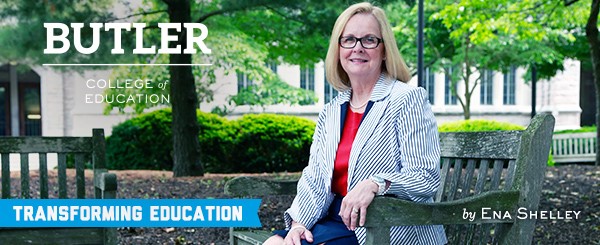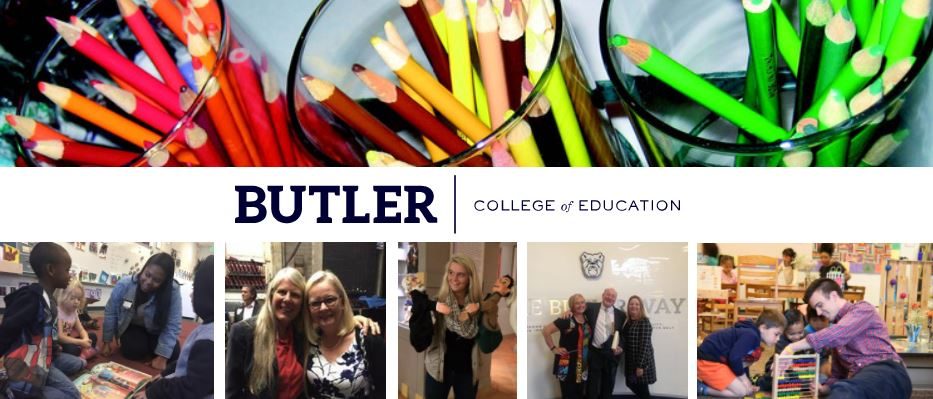
“When I was five years old, my mother always told me that happiness was the key to life. When I went to school, they asked me what I wanted to be when I grew up. I wrote down ‘happy.’ They told me I didn’t understand the assignment, and I told them they didn’t understand life.”
—John Lennon
A new school year is now underway and I offer the quote from John Lennon as a provocation for all of us to consider the purpose of education. Obviously the academic subjects, skills, and knowledge are important but if we do not consider our mental health and well-being, what have we created? No one can be happy every minute of life, but how do we help our students find joy and peace in everyday living?
I had the wonderful opportunity to spend time with first-year students at Butler University during their new student orientation program. Many of the students shared they had felt pressured to choose a major, not only in the college application process, but in middle school! This made me wonder why there is a push to know what you want to do your entire life when you are 13 or 14 years old. When I talked with my student group, they revealed the pressure they had felt in achieving the grades to get into a good college. I asked them to describe the joy they found in learning. The room was silent. Then I asked them to tell me about their favorite teachers and what made them special. The light came on in their eyes. They described the teachers as passionate, funny, energetic, engaging, role models, inspirational, and caring. I asked, “Were they happy?” and of course there was a resounding reply of “YES!” I asked if these wonderful teachers made them want to learn, not for the grade but for the learning. Again, a resounding “YES!” When I shared with the group that most college students change their majors three to five times, there were sighs of relief. I asked the group what they wanted most in life…wait for it….you guessed it—TO BE HAPPY!
Dr. James L. Hymes, an educational pioneer in the field of early childhood education, wrote in 1968 about the valuing of each age of life. “Why is it when a child is five years old we talk about what we must do to get him/her ready to be six years old? Why do we not celebrate the wonder of being all there is as a five-year-old, and low and behold, you will become six?” Why are we focused on pushing our children to make choices about careers when they are so young without considering there are jobs that will be created during their lifetime that we cannot imagine? Why are we not focused on happiness and well-being as much as we are focused on preparing them to be college- and career-ready?
One educator and author who has transformed my personal and professional life was Dr. Kathy Cramer. She published three books based upon research in the area of positive psychology and asset-based thinking. Sadly, Dr. Cramer passed away this summer, but her legacy lives on for all she taught and inspired in her text, Change the Way You See Everything. Dr. Cramer wrote:
Asset-Based Thinking (ABT) is not blind optimism or magical thinking. It does not offer the quick fix or overpromise results. It’s not based on theory alone. It’s based on direct, systematic observation into how a growing minority of highly effective, satisfied people think, feel, and act. ABT takes ‘positive thinking’ to a whole new level of engagement. While positive thinking calls for a positive attitude about life and the future, ABT calls for positive action and traction in the present moment. ABT puts the power of personal, interpersonal, and situational assets in your hands so that you can make progress and create the future you most desire. (p.15)
I believe that Dr. Cramer and John Lennon are providing life lessons on how to be happy! And to learn even more, I invite you to attend Dr. Jill Bolte Taylor’s speech to be held on September 14, 2016 at Clowes Memorial Hall. This will be the kick-off event for a yearlong Brain Project at Butler University so that as a community of learners we can better understand how our brains work. Jill’s story is truly an inspiration of how a massive stroke led to her deep understanding of positive energy and happiness.
In closing, I invite you to watch this the video of Dr. Arthur Hochman who shares his insight and wisdom into the value of art as a medium for learning, understanding, and HAPPINESS! There could be no better example of a person living their life with purpose and bringing happiness to others than him!
Until next month,
Dr. Ena Shelley
Dean, College of Education
